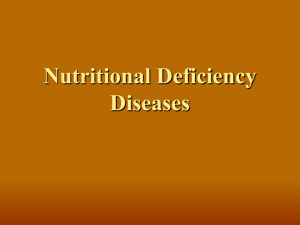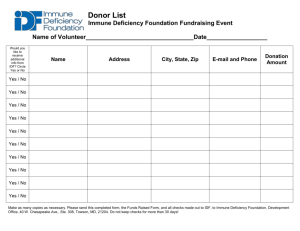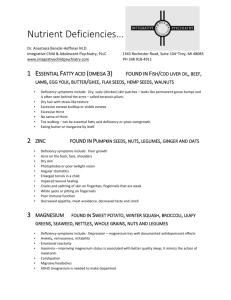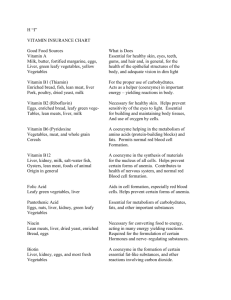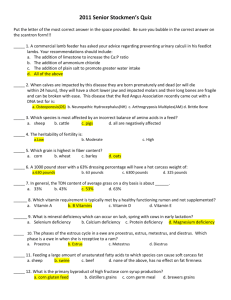Vitamin and Mineral Deficiencies
advertisement
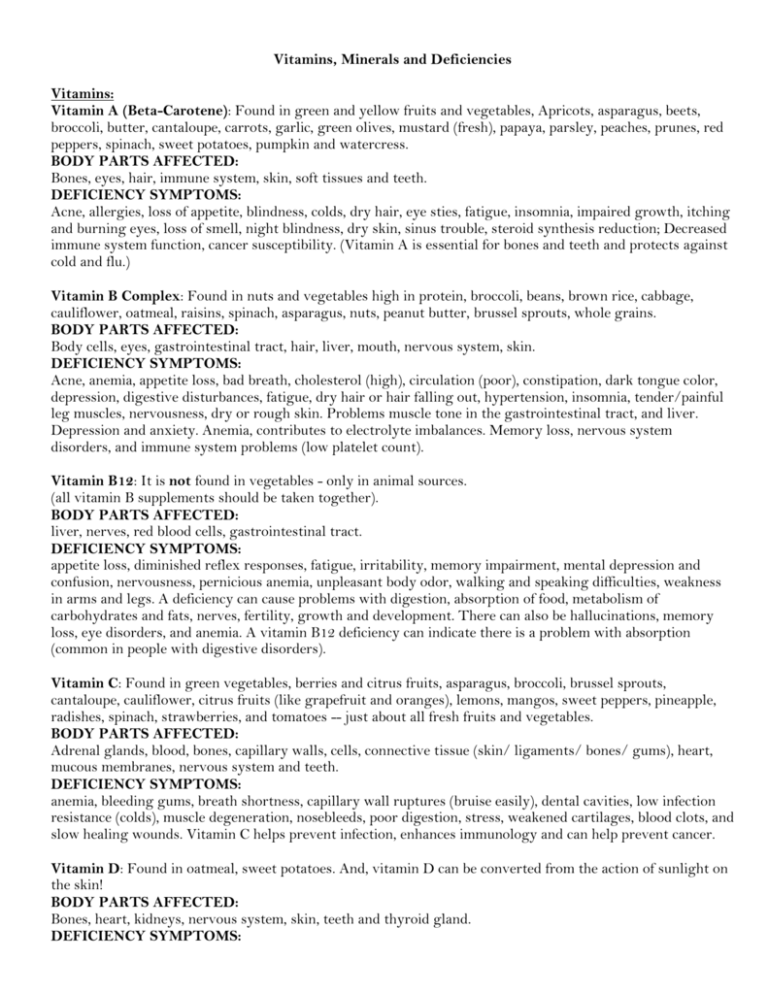
Vitamins, Minerals and Deficiencies Vitamins: Vitamin A (Beta-Carotene): Found in green and yellow fruits and vegetables, Apricots, asparagus, beets, broccoli, butter, cantaloupe, carrots, garlic, green olives, mustard (fresh), papaya, parsley, peaches, prunes, red peppers, spinach, sweet potatoes, pumpkin and watercress. BODY PARTS AFFECTED: Bones, eyes, hair, immune system, skin, soft tissues and teeth. DEFICIENCY SYMPTOMS: Acne, allergies, loss of appetite, blindness, colds, dry hair, eye sties, fatigue, insomnia, impaired growth, itching and burning eyes, loss of smell, night blindness, dry skin, sinus trouble, steroid synthesis reduction; Decreased immune system function, cancer susceptibility. (Vitamin A is essential for bones and teeth and protects against cold and flu.) Vitamin B Complex: Found in nuts and vegetables high in protein, broccoli, beans, brown rice, cabbage, cauliflower, oatmeal, raisins, spinach, asparagus, nuts, peanut butter, brussel sprouts, whole grains. BODY PARTS AFFECTED: Body cells, eyes, gastrointestinal tract, hair, liver, mouth, nervous system, skin. DEFICIENCY SYMPTOMS: Acne, anemia, appetite loss, bad breath, cholesterol (high), circulation (poor), constipation, dark tongue color, depression, digestive disturbances, fatigue, dry hair or hair falling out, hypertension, insomnia, tender/painful leg muscles, nervousness, dry or rough skin. Problems muscle tone in the gastrointestinal tract, and liver. Depression and anxiety. Anemia, contributes to electrolyte imbalances. Memory loss, nervous system disorders, and immune system problems (low platelet count). Vitamin B12: It is not found in vegetables - only in animal sources. (all vitamin B supplements should be taken together). BODY PARTS AFFECTED: liver, nerves, red blood cells, gastrointestinal tract. DEFICIENCY SYMPTOMS: appetite loss, diminished reflex responses, fatigue, irritability, memory impairment, mental depression and confusion, nervousness, pernicious anemia, unpleasant body odor, walking and speaking difficulties, weakness in arms and legs. A deficiency can cause problems with digestion, absorption of food, metabolism of carbohydrates and fats, nerves, fertility, growth and development. There can also be hallucinations, memory loss, eye disorders, and anemia. A vitamin B12 deficiency can indicate there is a problem with absorption (common in people with digestive disorders). Vitamin C: Found in green vegetables, berries and citrus fruits, asparagus, broccoli, brussel sprouts, cantaloupe, cauliflower, citrus fruits (like grapefruit and oranges), lemons, mangos, sweet peppers, pineapple, radishes, spinach, strawberries, and tomatoes -- just about all fresh fruits and vegetables. BODY PARTS AFFECTED: Adrenal glands, blood, bones, capillary walls, cells, connective tissue (skin/ ligaments/ bones/ gums), heart, mucous membranes, nervous system and teeth. DEFICIENCY SYMPTOMS: anemia, bleeding gums, breath shortness, capillary wall ruptures (bruise easily), dental cavities, low infection resistance (colds), muscle degeneration, nosebleeds, poor digestion, stress, weakened cartilages, blood clots, and slow healing wounds. Vitamin C helps prevent infection, enhances immunology and can help prevent cancer. Vitamin D: Found in oatmeal, sweet potatoes. And, vitamin D can be converted from the action of sunlight on the skin! BODY PARTS AFFECTED: Bones, heart, kidneys, nervous system, skin, teeth and thyroid gland. DEFICIENCY SYMPTOMS: Brittle and fragile bones, burning in mouth and throat, diarrhea, insomnia, irregular heartbeat, low blood calcium, myopia, nervousness, pale skin, poor metabolism, rickets, sensitivity to pain, soft bones and teeth, Osteoporosis and Osteopenia, and hypocalcemia. Vitamin D also enhances the immune system. Vitamin E: Found in vegetable oils, whole grains, vegetables (dark leafy green), nuts and seeds, spinach, almonds, kale, peanuts, brown rice, cornmeal, oatmeal, sweet potatoes, soy beans, unrefined cereal, and wheat germ. BODY PARTS AFFECTED: Arteries, blood vessels, heart, lungs, nerves, pituitary glands and skin. DEFICIENCY SYMPTOMS: Enlarged prostate gland, gastrointestinal disease, dry or falling out hair, impotency, miscarriages, muscular wasting, muscle weakness, sterility. Decreased circulation, slow tissue healing, leg cramps. Vitamin E helps prevent cancer, cardiovascular disease, cataracts and reduces scarring from some wounds. Zinc and Vitamin E work together. Vitamin K: Found in alfalfa, broccoli, dark green leafy vegetables and soybeans, brussel sprouts, cabbage, cauliflower, oatmeal, rye, and wheat. BODY PARTS AFFECTED: Blood, bones, metabolism and liver function. DEFICIENCY SYMPTOMS: Brittle or fragile bones, low platelet count in blood and poor blood clotting, high glucose in blood. Vitamin K plays an essential role in blood clotting and bone formation. Can help to prevent osteoporosis. Vitamin K also converts glucose into glycogen for storage in the liver. Folic Acid: Found in beans, bran, barley, brown rice, dates, green leafy vegetables, lentils, oranges, split peas, root vegetables (like carrots), whole grains, whole wheat and yeast. BODY PARTS AFFECTED: Metabolism, red blood cells, overall growth and development, and nerves. DEFICIENCY SYMPTOMS: Sore tongue, B12 deficiency, depression or anxiety, and fatigue. Folid Acid is needed for energy production, protein metabolism, the formation of red blood cells and it vital for normal growth and development. A deficiency of Folic Acid may contribute to depression and anxiety, a B12 deficiency, and birth defects in pregnant women. Minerals: Calcium*: ONE OF THE ESSENTIALS IN MAINTAINING ELECTROLYTE BALANCE -- Found in green leafy vegetables, sea vegetables (arame, dulse, hijki, kelp, wakame), molasses, nuts, almonds, asparagus, broccoli, cabbage, carob, kale, oats, parsley, prunes, whey, tofu. BODY PARTS AFFECTED: Blood, bones, circulatory/ digestive/enzymatic/ immune and nervous systems, heart, muscles, skin, soft tissues and teeth. DEFICIENCY SYMPTOMS: Arm and leg numbness, brittle fingernails, eczema, fragile bones, headaches, heart palpitations, hypertension, insomnia, irritability, muscle cramps, nervousness, osteomalacia, osteoporosis, osteopenia, periodontal disease, rickets, tooth decay; Irregular heartbeat and slowed nerve impulse response, decreased muscle growth, aching joints, and arthritis. Calcium is an essential mineral for overall health. Vitamin D is essential for proper calcium absorption and utilization. Chromium (GTF): Found in apples, black pepper, whole grains, grapes, corn and corn oil, mushrooms, potatoes, beer, brown rice and dried beans. BODY PARTS AFFECTED: Adrenal glands, brain, blood, circulatory system, heart, immune system, liver and white blood cells. DEFICIENCY SYMPTOMS: Disturbed amino acid metabolism, increased serum cholesterol, impaired glucose tolerance, lack of energy, myopia, protein/calorie malnutrition, susceptibility to infection; Lowered or escalated blood sugar levels, coronary artery disease. It is essential to the metabolism of glucose and is needed for energy and the synthesis of cholesterol, fats and protein. Copper: Found in almonds, avocado, beans, barley, cauliflower, nuts, oranges, peanuts, pecans, raisins, legumes, green leafy vegetables, radishes and soybeans. BODY PARTS AFFECTED: Blood, bones, circulatory system, hair, and skin. DEFICIENCY SYMPTOMS: depression, elevated serum cholesterol, fractures and bone deformities, general weakness, impaired respiration, skin sores. Osteoporosis, slowed healing procsss, poor hair and skin coloring and loss in taste sensitivity. Copper works in balance with zinc and vitamin c to form elastin and aids in the formation of bones and red blood cells. Iodine: Found in iodized salts, seafood and kelp. Also: asparagus, garlic, lima beans, mushrooms, sesame seeds, soybeans, spinach (cooked), turnip greens. BODY PARTS AFFECTED: Immune system, thyroid, brain. DEFICIENCY SYMPTOMS: Decreased chances of breast cancer, slowed mental and physical development. Thyroid dysfunction. Iodine is needed for a healthy thyroid. Mental retardation may result from an iodine deficiency in children. It is only needed in trace amounts. Iron: Found in dark green leafy vegetables, enriched breads and cereals, brewer's yeast, dates, dulse, kidney and lima beans, lentils, millet, parsley, peaches, pears, dried prunes, pumpkins, raisins, rice and wheat bran, sesame seeds and soybeans. BODY PARTS AFFECTED: Blood, bones, metabolic system, muscles, nails, skin and teeth. DEFICIENCY SYMPTOMS: Breathing difficulties, brittle nails, dry or falling-out hair, dizziness, iron deficiency anemia (pale skin, fatigue), constipation, sore or inflamed tongue. Iron is vital for it's production of hemoglobin and oxygenation of red blood cells. Needed for healthy growth and the resistance of disease, and for a healthy immune system and energy. Magnesium*: ONE OF THE ESSENTIALS IN MAINTAINING ELECTROLYTE BALANCE -- Found in apples, apricots, bananas, brown rice, figs, garlic, lima beans, peaches, sesame seeds, tofu, green leafy vegetables, wheat and whole grains. BODY PARTS AFFECTED: Arteries, bones, cells, digestive/ immune/ nervous and reproductive systems, heart, nerves, and teeth. DEFICIENCY SYMPTOMS: aching muscles, anxiety, broken nails, confusion, decreased blood pressure and body temperature, disorientation, easily aroused anger, hair loss, hyperactivity, insomnia, muscle tremors, nervousness, noise sensitivity, rapid pulse and sound sensitivity. Deficiency interferes with the transmission of nerve and muscle impulses, causes depression and dizziness, muscle weakness, twitching, heart disease and blood pressure problems, and disruption in proper pH balance. Magnesium plays an important role in the formation of bone, carbohydrate and mineral metabolism. It is vital to enzyme activity and assists in calcium and potassium uptake. Use of diuretics, laxatives, vomiting and diarrhea can significantly contribute to the body's need for magnesium. Phosphorus*: ONE OF THE ESSENTIALS IN MAINTAINING ELECTROLYTE BALANCE -- Found in asparagus, bran, corn, dried fruit, garlic, sunflower and pumpkin seeds, wheat bran and whole grains. BODY PARTS AFFECTED: Bones, brain cells, circulatory and digestive systems, eyes, liver, muscles, nerves and teeth. DEFICIENCY SYMPTOMS: Appetite loss, bone pain, fatigue, irregular breathing, nervous disorders; Bone and tooth problems, heart and kidney problems. Phosphorus is essential for helping the body to utilize vitamins and to convert food to energy. A balance of magnesium, calcium and phosphorus should always be maintained in the body for proper health. Diets high in junk food, including soda and diet soda, can contribute to too much phosphorus which can inhibit calcium uptake. Potassium*: ONE OF THE ESSENTIALS IN MAINTAINING ELECTROLYTE BALANCE – Found in fruit, vegetables, whole grains, apricots, avocado, bananas, brown rice, cantaloupe, carrot juice, dates, figs, dried fruit, garlic, lima beans, nuts, peaches, potatoes, raisins, wheat bran and yams. BODY PARTS AFFECTED: Blood, endocrine/ digestive and nervous systems, heart, kidneys, muscles and skin. DEFICIENCY SYMPTOMS: Acne, constipation, continuous thirst, decreased blood pressure, dry skin, edema, increased cholesterol, insomnia, muscle and general weakness, nervousness, respiratory distress, salt retention, skin and hair problems, irregular heartbeat, weak reflexes; Deficiency interferes with the transmission of nerve and muscle impulses, heart palpatations and arrhythmias, heart attack, stroke. Potassium is important for chemical reactions within the cells and aids in maintaining stable blood pressure and in transmitting electrochemical impulses. It also regulates the transfer of nutrients to the cells. Use of diuretics, laxatives, vomiting and diarrhea can significantly contribute to the body's need for potassium. Sodium*: ONE OF THE ESSENTIALS IN MAINTAINING ELECTROLYTE BALANCE -- Virtually all foods contain sodium. Celery, salt, seafood and sea vegetables. BODY PARTS AFFECTED: Blood, lymphatic system, muscles and nerves. DEFICIENCY SYMPTOMS: appetite loss, cramps, decreased resistance to infection, eye disturbances, fatigue, intestinal gas, muscle shrinkage, vomiting, weakness; Confusion, low blood sugar, dehydration, lethargy, heart palpatations and heart attack. Sodium is necessary for maintaining the proper water balance and blood pH. It is also needed for stomach, nerve and muscle function. Sulfur: Found in brussel sprouts, dried beans, cabbage, garlic, and onions. BODY PARTS AFFECTED: Skin, immune system, blood, liver DEFICIENCY SYMPTOMS: Dryness of skin, increased risks of infection, poor resistance to bacterial infections. Sulfur is essential to disinfecting the blood and resisting bacteria. It aids in oxidation reactions, stimulates bile secretions in the liver and protects against toxic substances. Zinc: Found in whole grains, lima beans, mushrooms, pecans, pumpkin seeds, soybeans, wheat germ and whole grains. BODY PARTS AFFECTED: Blood, bones, eyes, heart, joints, liver, and prostate gland. DEFICIENCY SYMPTOMS: Acne, brittle nails, decreased learning ability, delayed sexual maturity, eczema, fatigue, loss of taste and smell, poor appetite, poor circulation, poor memory, prolonged wound healing, retarded growth, skin problems, splitting hair, sterility, white spots on nails; Problems with prostate gland function, and immune system, liver damage. Zinc intake and absorption is needed to maintain the proper concentrations of vitamin E in the blood. Zinc levels can be decreased by diarrhea, kidney disease, cirrhosis or the liver, diabetes. Consuming "hard water" can upset zinc levels.
